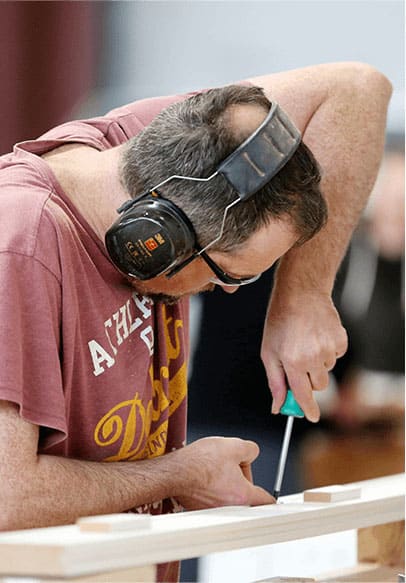Unwanted noise is a big issue in what is an increasingly busy world. And that applies not only to commercial settings, but homes too.
A padded studio might be the first thing that comes to mind when you think of soundproofing. Yet there are other more realistic, practical and cost-effective ways to prevent or reduce noise in homes and domestic environments, such as soundproof doors, panels, insulation, walls or ceilings.
For instance, you might not know that doors are a very important factor to consider when you’re trying to manage excess noise.
Sound can enter through standard interior doors because they are hollow and have large gaps above, below and around the door frames.
Soundproof doors, on the other hand, are a great noise reduction solution that could greatly improve your home or work environment.
What are soundproof doors?
These doors are heavily insulated to reduce and block noise pollution. They are similar to acoustic doors but are built using materials that reduce noise, and can also include vision panels made of glass.
Essentially, soundproofing gives sound extra obstacles to travel through – reducing the energy of each soundwave to make it weaker and less audible.
These doors can offer sound reduction of up to 47dB*. You can find out more about decibel ratings here.
There are two elements to soundproofing:
Absorption
The ability to stop and absorb an equal or large part of sound. Absorption relies on the mass and density of the door.
Insulation
Well-insulated doors stop noise from escaping a room in the first instance before it needs blocking.
These are the main ways soundproof doors work to reduce noise, while they also usually contain foam insulation and rubber seals along the edges. This allows for an almost airtight seal to prevent sound leakage.
Types of Soundproof doors:
There are many forms and styles, such as:
Contemporary styles
- French doors
- Bi-folding doors
- Sliding doors
- Patio/balcony doors
- Front doors (exterior doors)
Standard quality styles
- Timber flush doors
- Timber & glazing mix doors
- Steel flush doors
- Laminate doors
The type of door you select will affect the sound absorption and barrier. A denser material will have a higher mass and, as such, won’t let as much sound pass through. Some materials such as glass also may need reinforcing or additional insulation to improve its soundproof qualities.
Soundproof doors can be multi-functional, as they can also be fire-rated doors too. This means they can also be fire-resistant to a certain level- depending on their features and fire-rating or ‘FD’ number. Discover more about fire-rated doors here.

2-Door Systems
If you are looking to improve sound reduction in areas with extreme sound or need for full sound blocking, a 2-door system can be a great option. A 2-door system is just what it sounds like – it consists of two singular soundproof doorsets with a space in between. This creates what is known as a ‘sound buffer’ that sound can be captured within – so it neither escapes nor enters any other space.
2-door systems are typically seen at cinemas, where there are usually two single doors to go through before you enter the auditorium or screening room. These two doors aim to totally absorb or silence sound.
Do I need one?
Anyone suffering from noise disturbances or that wants to improve the acoustics within a space may want to consider soundproof doors.
Some example consists of:
- You work from home
- You have noisy neighbours or live in a noisy neighbourhood
- People around you play loud instruments
- You live in shared households or flats
- Loud workplaces
- Privacy issues or a need for confidentiality
- Busy towns or cities, or even village houses on or near roads with high traffic volumes
Soundproof doors are for both commercial and domestic use. They can help in many different scenarios. But what makes them rigorous?
Soundproof doors are an investment. And, as you may not necessarily be able to invest in one straightaway, there are other steps you can make to soundproof your home or workspace – check out our article about How to Soundproof a Door to find out more.

Other places they’re useful
Noisy areas, buildings, roads, and spaces such as:
- Offices
- Hospitals
- Building sites or factories
- Doctors surgeries
- Schools or universities
- Theatres and cinemas
- Broadcasting or recording studios
These are commercial environments that will suffer with large noise pollution and noise above 55dB, and are thereby likely to potentially cause people physical or mental health problems, according to the World Health Organisation.
The benefits:
With our quality soundproof doors, you’ll be getting the best of both worlds – fire-rated, soundproof, as well as:
Security: The doors are heavily insulated and usually have a high density and mass. As such, they are very strong and offer a great level of safety and security for any property.
Efficiency: Use of insulated and acoustic seals ensure there are no gaps around the door. These stop the spread of sound, as well as draughts, therefore withholding heat and helping to reduce energy bills. Additionally, this can improve air quality, as insulation stops particles and pollutants from entering and keeps the moisture and humidity level constant.
Privacy: The blockage of sound, including speech, means that confidential meetings cannot be overheard. This provides a level of privacy which is incredibly important within industries such as business and healthcare, where personal and private details are often involved.
Noise reduction: If you are investing in acoustic windows, it’s vital that any doors you fit are also capable of achieving the same effect. A standard soundproof door can reduce up to 35dB of sound – however, a 2-door system can go one better and can increase this.
Increased Value: Having a soundproof space provides you with a serene, safe, and private place that can add value – especially if the building is in a busy area. Once installed, these doors can last a lifetime with the correct maintenance and care.
Health: Excessive noise disturbances can be stressful and impact daily life in many ways, including causing hearing problems, interrupting sleep, and migraines. Blocking noise will improve quality of life and provide a needed peace and quiet.
Make sure you get the best option for you – if you’re unsure, our team at Vigor Doors can help advise you.
Custom Made:
Like all other products at Vigor doors, we can custom make your door, allowing it to be personalised and designed to your own custom factors and finishes.
This can include fitting doors to your space perfectly through proper sizing and professional installation. Some custom additions and finishes we can make include:
- Wood veneer
- Laminate
- Panels (vision)
- Glazing
- Acoustic paint
- Seals / brushes
- Ironmongery (door knockers, handles, letter boxes)
Our in-depth knowledge, experience creating custom orders and contacts within the industry mean that we should be able to lock down your bespoke requirements with ease.
If you have a custom requirement or want to discuss your options, please speak to a member of our team today.
Soundproof Tips & Facts
- Sound travels faster through hard materials like wood than it does through air – 8,859 miles per hour (mph) versus 767 mph. This is what causes many soundproof issues inside buildings.
- Elevating computers, TVs, stereos, and other sound systems can help to reduce additional noise, as they will no longer vibrate on floors or walls as easily
- Using rubber pads under loud machinery or appliances such as washing machines and tumble driers can help to reduce the noise they make
- When checking rooms for gaps that may let noise or smoke through, try turning out the lights and closing blinds then looking for any space that light shines through. These will be the same gaps sound/smoke will come through in the event of a fire
- Trees and plants around your building can act as natural sound barriers – but may cause more noise during bad weather.
FAQs
-
If I already have soundproof windows...
Soundproof windows aim to keep external noises from coming into the building – doors can assist and stop internal noise that may already occur within buildings.
Windows are also made of glass, so will have less in the way of sound reduction than glass and have a lower decibel rating than doors.
-
Is D-I-Y soundproofing a door a bad idea?
Small changes to improve the soundproofing and acoustics of your space may be worth your time and D-I-Y could save you money. Things such as adding seals, brushes or rubber strips can improve soundproofing and you can add these yourself with the correct instructions and tools.
However, when installing doors, you should always look to use a good UK manufacturer with expert installers. Incorrectly installed doors can cause more problems and safety issues, if not put in by a professional and trustworthy company – like Vigor Doors.
-
Are composite doors soundproof?
Composite doors are not designed to be truly soundproof; they may block some noise due to mass/thickness but do not contain soundproofing elements such as seals, insulation and rubber covers that stop noise.
We offer similar styles of doors with a laminated or veneer finish that offer effective soundproof protection.
If you feel like you need some peace and harmony, why not give our team at Vigor Doors a call to discuss your soundproof door options? Simply call us on 01642 265 034, or alternatively drop us a line at info@vigordoors.com.
- Company registered number: 11892199
- Place of registration: England and Wales
- Copyright © 2025 Vigor Doors. All rights reserved
- Corpsvector
